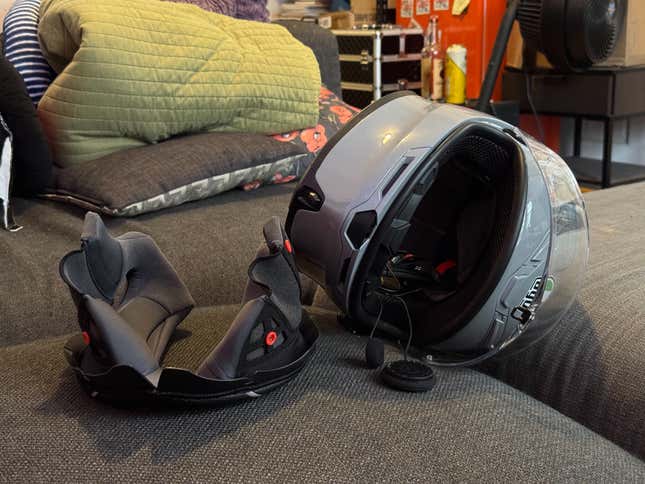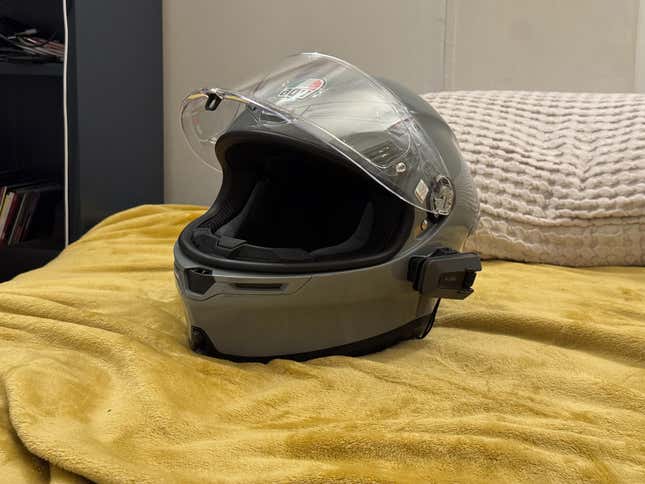I really like motorbike comms methods. I’ve had a Cardo PackTalk Edge for some time now, and a PackTalk Black earlier than that — for so long as I’ve severely ridden bikes, I’ve had a comm unit. I really like having music in my helmet, I really like the power to make telephone calls, I really like having the ability to hear my turn-by-turn instructions once I’m going someplace I’ve by no means been earlier than.
But, I hate the set up course of. Placing a comm system right into a helmet is among the worst elements of proudly owning bike gear, and it’s all the time one thing I dread. At the moment marked one other comm set up, my first shortly, and once more I’m pressured to ask: Why does this should be so irritating?
Final evening I rode house from the climbing fitness center within the rain, with the visor on my Arai XD-4 up the entire time to maintain it from fogging. At the moment I’ve one other wet trip deliberate, which meant it was lastly time to do the factor I’ve been dreading for weeks now: Transfer my Cardo from the Arai into the AGV K6 I lately obtained in for testing.

To be clear, my complaints right here aren’t distinctive to AGV and have little to do with Cardo. I’ve helmets from 4 producers in my bed room proper now, unfold throughout the worth spectrum, and just one had a comm set up course of that was in any respect environment friendly. The K6 is as dangerous for comms as my previous Shoei RF-1200, and as dangerous as my Icon Area might be each time I get a spare comm to place there for pillions. It’s an business customary set up course of, and it sucks so dangerous.
Mounting a comm base on a helmet is okay sufficient. The unit itself will often find yourself in some barely inconvenient place — too excessive up on the AGV and Arai, too far again on the Shoei — however these are affordable lodging for helmet aerodynamics. I’m not anticipating helmet producers to take third-party comms under consideration when shaping their shells, these may be designed for security and calmness as they’re.
No, my criticism is with helmets’ inside pads and liners. They’re constructed with out consideration for wires operating between the comm unit and the audio system and mic, which makes getting the whole lot into place a serious trouble. Add within the finnicky clips and snaps that each helmet maker makes use of, and you find yourself consistently positioning and repositioning and fidgeting with a helmet to get the whole lot shut sufficient, earlier than finally dropping by the wayside and settling for “the whole lot is contained in the helmet.”
For this K6, putting in my Cardo meant chopping out a part of the inflexible skirt across the cheek pads. That is the half that really clips in on the shell facet of the EPS foam, and it’s routinely designed with none form of channel for cables. It’s a must to make that channel your self, after which have an absolute ache of a time getting the skirt again in place.
Then, after all, it’s a must to work out the interior wiring. Comm harnesses have a number of plugs for a number of units of mics and audio system, which suggests you could discover methods to safe a full 3.5-mm jack and plug someplace in your consolation liner with out it jabbing your neck. That is one scenario the place I’d genuinely desire some form of proprietary ribbon cable connector, as a result of a minimum of that would lay flat in opposition to the froth.
Find base on shell. Mount base. Pull out pads. Mark wiring location on skirt. Minimize skirt. Mount velcro for audio system and mic. Mount audio system and mic. Place pads again in. Skirt doesn’t match proper. Place pads again in with a special orientation. Do this three extra occasions till the whole lot suits. Notice one in every of your audio system fell out someday in that course of. Slam your head into your sofa. Pull out liner. Lather, rinse, repeat, till you’ve lastly obtained the whole lot in there. Why is that this nonetheless the way it works?
Some helmets, I admit, provide an answer. My very own Icon Area has a useful cutout for a proprietary comms system, a Sena unit that slots proper in simply — assuming you’ve gotten an Icon Area, as a result of it doesn’t match anything even in Icon’s personal lineup. Now you’re spending $350 for tech that solely suits your one helmet, so that you’re caught upgrading each when your comm dies or your EPS ages out and you discover the Area has been changed with some up to date design. In the meantime my $360 Cardo is now on its third helmet, throughout two totally different manufacturers. If wanted, I may put it on one other, the best way I did right now with the AGV. I may even swap it to the Area, the place it might play good with my Cardo-owning using associates, not like the Sena.

You’ll have seen a conspicuous absence in my record of helmets that suck to put in comms into. That’s as a result of each Arai XD-4s I’ve had, with their distinctive and bizarre pad design, have been significantly simpler than another helmet I’ve put comms into. Perhaps it’s aided by the observe of getting needed to do a second set up after I crashed my first helmet, however Arai’s inside structure simply makes wiring and speaker finding simpler. It’s a disgrace you may solely get that marginal enchancment for Arai cash, although, and it’s a nonstarter for anybody whose head form doesn’t fairly match the model.
Trendy helmets might have cutouts for audio system, however they nonetheless aren’t really constructed to have comms put in in them. No model that I’ve but discovered has made the method straightforward, and any model that tries solely finally ends up with a proprietary money seize — even worse than the frustration of a common unit set up. From the most effective of the most effective to the worst of the worst, helmet makers simply aren’t fascinated about Cardo or Sena. Is it a security factor? Is there no cash in being the helmet producer that accommodates comms? Why does this course of should be a lot of a ache?


